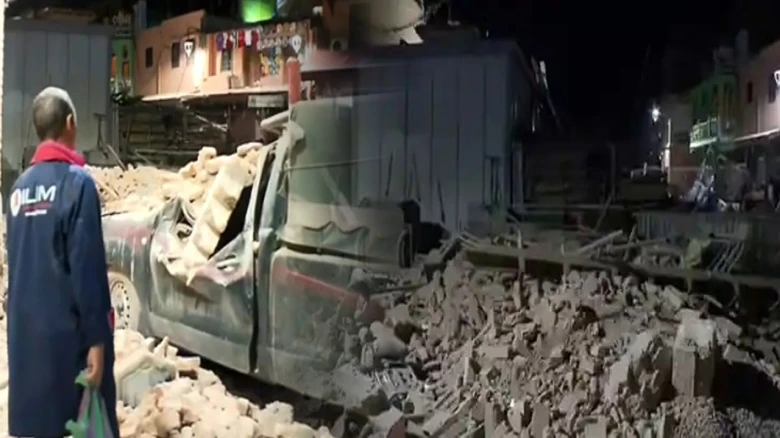Regional

A devastating earthquake, measuring 6.8 on the Richter scale, struck Morocco on Friday night...
Digital Desk: A devastating earthquake, measuring 6.8 on the Richter scale, struck Morocco on Friday night, leaving a trail of destruction and despair in its wake. Preliminary government reports indicate that at least 296 people have lost their lives, while another 153 have been reported injured in the aftermath of the seismic event.
The earthquake, which originated 44 miles (71 kilometers) southwest of the popular tourist destination Marrakesh, occurred at a depth of 18.5 kilometers and struck at precisely 11:11 pm (2211 GMT), according to the US Geological Survey. Terrified residents in Marrakesh described the tremors as "unbearable," with buildings visibly swaying, causing widespread panic.
Abdelhak El Amrani, a 33-year-old resident of Marrakesh, recounted the terrifying moments: "We felt a very violent tremor, and I realized it was an earthquake. I could see buildings moving. We don't necessarily have the reflexes for this type of situation. Then I went outside, and there were a lot of people there. People were all in shock and panic. The children were crying, and the parents were distraught."
Fayssal Badour, another Marrakesh resident, described the chaotic scene: "I stopped and realized what a disaster it was. It was very serious, as if a river had burst its banks. The screaming and crying were unbearable."
The power outage lasting ten minutes and a temporary loss of telephone network connectivity only exacerbated the situation, leading residents to seek refuge outside. Hospitals in Marrakesh received a "massive influx" of injured individuals seeking medical assistance.
The earthquake's impact extended beyond Marrakesh, with reports of tremors felt in the coastal cities of Rabat, Casablanca, and Essaouira. In Essaouira, located 200 kilometers west of Marrakesh, residents reported minor damage to buildings and facades falling.
The US Geological Survey's PAGER system, which assesses the impact of earthquakes, issued an orange alert for economic losses, indicating that significant damage is likely. Such alerts often necessitate a regional or national-level response due to the scale of destruction expected.
Moroccan media has reported that this earthquake is the most powerful to hit the country to date. It serves as a grim reminder of the region's vulnerability to seismic activity. In 2004, a devastating earthquake in Al Hoceima, northeastern Morocco, claimed the lives of at least 628 people and injured 926 others. Additionally, the 1980 El Asnam earthquake in neighboring Algeria, measuring 7.3 on the Richter scale, remains one of the most destructive earthquakes in recent history, resulting in the loss of 2,500 lives and leaving over 300,000 people homeless.
While the immediate focus is on rescue and recovery efforts, this tragic event underscores the importance of earthquake preparedness and building resilience in this seismically active region.
Leave A Comment